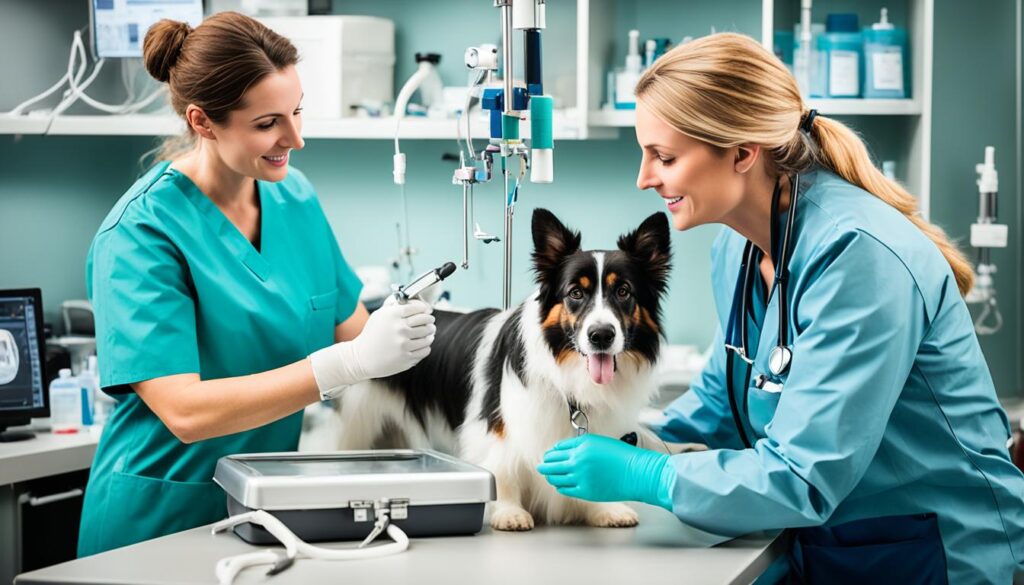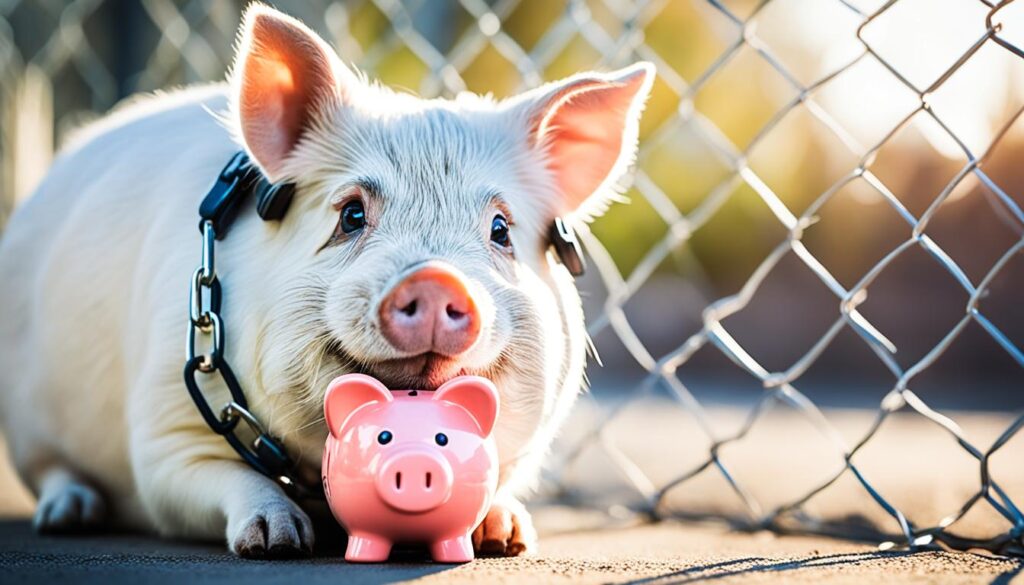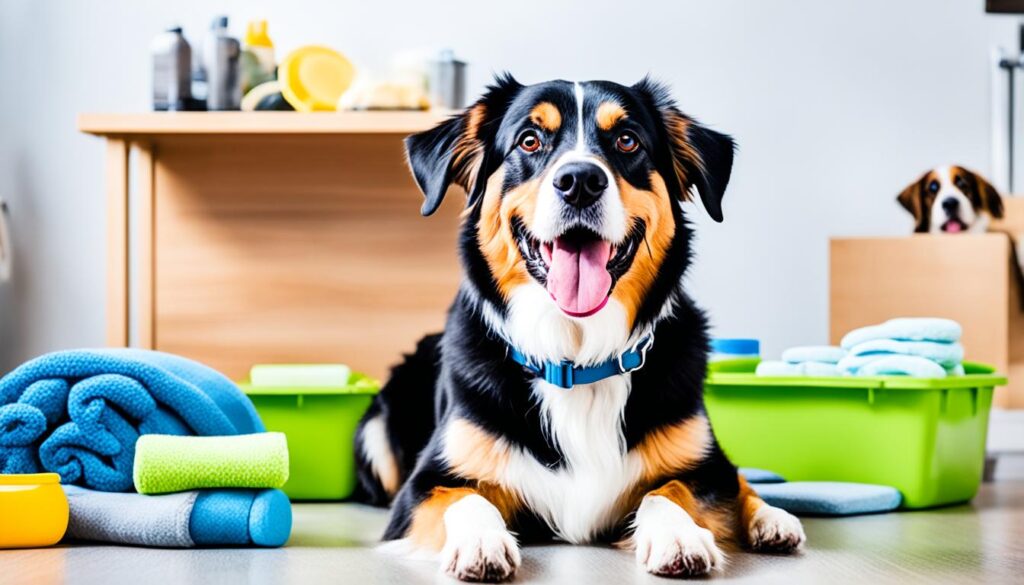Pets are more than just animals; they are beloved members of our families. Whether you have a wagging-tailed dog, a purring cat, or any other delightful creature, providing them with the best care is essential for their well-being. In this comprehensive guide, we’ll explore the fundamental aspects of pet care, covering everything from nutrition and exercise to grooming and mental stimulation. So, let’s dive into the world of responsible and loving pet ownership!
Have you ever wondered how to ensure your furry friend lives a long and healthy life? What are the essential steps to keep them happy and thriving? Let’s uncover the secrets to pet care and embark on a journey of discovery together.
Key Takeaways:
- Pet care is crucial for the well-being of your furry friend.
- Proper nutrition and exercise are essential for maintaining a healthy lifestyle.
- Grooming and veterinary care contribute to the overall health of your pet.
- Mental stimulation and emotional bonding are vital for their happiness and well-being.
- Pet insurance provides financial security for unexpected accidents and illnesses.
Healthy Nutrition
The foundation of pet care starts with a well-balanced and nutritious diet. Each pet has unique dietary needs, so it’s crucial to understand what’s best for your furry friend. For dogs, high-quality dog food that includes essential nutrients and proteins should be the primary source of their diet. For cats, a protein-rich diet is essential to mimic their natural hunting habits. Remember, fresh water should always be available to keep your pets hydrated.
Dietary Needs for Dogs
Dogs are carnivores by nature and require a balanced and protein-rich diet to thrive. Providing them with high-quality dog food that contains a variety of essential nutrients is essential. Look for dog food that includes real meat, such as chicken or beef, as the first ingredient. Avoid foods with fillers, artificial additives, and excessive carbohydrates.
Dietary Needs for Cats
Cats are obligate carnivores, meaning they need a protein-rich diet to meet their dietary requirements. Their bodies are designed to process and derive nutrition from meat. Look for cat food that contains high-quality animal protein sources, such as chicken, turkey, or fish. Avoid grains and excessive carbohydrates in their diet, as these are not necessary for their nutritional needs.
The Importance of Fresh Water
Hydration is crucial for the overall health and well-being of your pets. Always ensure that fresh water is readily available for them. Provide clean water in a bowl that is easily accessible, and remember to refill it regularly to keep it fresh and appealing to your pets. Hydration is especially important during hot weather or if your pet is active or nursing.
Regular Exercise
Keeping your furry friend active is crucial for their overall well-being. Regular exercise not only helps them maintain a healthy weight but also prevents boredom and promotes mental sharpness. Just like humans, pets reap numerous benefits from staying active and engaged.
For dogs, daily walks are a fantastic way to keep their bodies moving and their minds stimulated. Not only does this activity provide physical exercise, but it also allows them to explore their surroundings, sniff out new scents, and socialize with other dogs and humans.
“A tired dog is a happy dog.”
Cats, on the other hand, require playtime to fulfill their natural hunting instincts. Engaging in interactive games and providing them with toys that encourage physical activity will keep them entertained and energized. Remember, cats are intelligent creatures, and stimulating their minds through playtime helps prevent laziness and encourages a healthy lifestyle.
If you’re looking for a more advanced form of exercise, agility training offers a fantastic opportunity for both mental and physical stimulation. This sport involves navigating an obstacle course, promoting coordination, focus, and strength. Agility training not only has numerous health benefits but also strengthens the bond between you and your pet, as you work together as a team.
Tips for incorporating regular exercise into your pet’s routine:
- Set aside dedicated time each day for exercise and play sessions.
- Vary the activities to keep your pet engaged and excited.
- Choose interactive toys and puzzles to challenge their minds.
- Ensure a safe and secure environment for outdoor activities.
Remember, regular exercise is key to maintaining your pet’s physical and mental well-being. So, lace up those sneakers, grab their favorite toys, and embark on a journey filled with health, happiness, and endless play!
Grooming and Hygiene
Proper grooming not only keeps your pets looking their best but also contributes to their overall health. Regular brushing helps prevent matting and reduces shedding. Depending on the breed, some pets may require professional grooming to maintain their coats effectively. It’s also important to give your pet stress-free baths to keep them clean and comfortable.
Grooming your pet is not just about vanity; it is an essential part of their well-being. Besides keeping their fur looking fabulous, regular brushing offers multiple benefits. It helps to remove dirt, dead hair, and tangles from their coat, preventing matting that can lead to discomfort and skin problems. Additionally, brushing stimulates blood circulation and distributes natural oils, keeping their skin healthy.
While some pets, like short-haired dogs, may not require frequent professional grooming, certain breeds with long or high-maintenance coats will greatly benefit from regular visits to a professional groomer. A professional groomer has the expertise and tools necessary to keep their coats in top condition, ensuring optimal health and appearance.
“The key to a healthy and happy pet lies in proper grooming. Regular brushing and professional grooming, when needed, not only keep your pet looking adorable but also contribute to their overall well-being.” – Dr. Emily Bennett, Veterinarian
In addition to brushing, regular bathing is crucial to maintain your pet’s hygiene. However, it’s essential to create a stress-free bathing experience for your furry friend. Start by choosing a suitable pet shampoo that matches their specific needs. Use lukewarm water and gently massage the shampoo into their fur, being careful to avoid contact with their eyes and ears. Rinse thoroughly, ensuring all soap residue is removed.
Grooming and bathing sessions also provide an excellent opportunity for you to inspect your pet’s skin, ears, teeth, and nails for any signs of issues or abnormalities. If you notice anything concerning, consult with your veterinarian.
Tips for Stress-Free Grooming
- Introduce grooming gradually, starting with short sessions and slowly increasing the duration as your pet becomes more comfortable.
- Use positive reinforcement techniques, such as treats and praise, to reward your pet during grooming sessions.
- Invest in grooming tools that are suitable for your pet’s coat type, such as slicker brushes, combs, and dematting tools.
- Regularly check your pet’s ears for any signs of redness, discharge, or irritation. Clean their ears using a veterinarian-recommended solution if necessary.
- Brush your pet’s teeth regularly to prevent dental issues. Use pet-safe toothpaste and a soft-bristle toothbrush designed specifically for pets.
By incorporating regular grooming practices into your pet’s routine, you not only maintain their appearance but also promote their overall health and well-being. Be patient, gentle, and attentive during grooming sessions, and soon it will become an enjoyable bonding experience for both you and your beloved pet.
Veterinary Care
Regular check-ups with a veterinarian are the foundation of responsible pet ownership. Just like humans, pets require regular medical attention to ensure their health and well-being. Veterinary care encompasses a range of essential services, including regular check-ups, vaccinations, preventive treatments, dental care, and maintaining accurate medical records.
Regular Check-ups
Bringing your pet for regular check-ups allows the veterinarian to monitor their overall health and detect any potential issues early on. These routine visits are an opportunity for the vet to perform a comprehensive examination, checking for signs of illness, injury, or other health concerns. Through regular check-ups, veterinarians can recommend preventive measures and provide advice on maintaining your pet’s well-being.
Vaccinations and Preventive Treatments
Vaccinations play a crucial role in protecting your pet from contagious diseases. By vaccinating your pet, you help prevent the spread of illnesses within the animal community. Preventive treatments, such as flea and tick prevention, heartworm medication, and deworming, are also important to keep your pet healthy and protected from common parasites and diseases.
Dental Care
Dental health is often overlooked but is a critical aspect of your pet’s overall well-being. Regular dental care, including brushing their teeth and providing dental treats or toys, helps prevent tartar buildup, gum disease, and other oral health problems. Your veterinarian will also perform dental cleanings if necessary to ensure your pet’s teeth and gums are in optimal condition.
Medical Records
Keeping accurate and up-to-date medical records for your pet is essential. These records help veterinarians track your pet’s medical history, monitor their progress, and provide appropriate treatment when needed. Medical records also facilitate communication between different healthcare providers, ensuring your pet receives consistent and comprehensive care throughout their lifetime.
Regular veterinary care is not only about addressing health issues but also about maintaining your pet’s quality of life. By providing preventive care, vaccinations, and routine check-ups, you can help your pet live a long, healthy, and happy life.

| Benefits of Veterinary Care | Why It Matters |
|---|---|
| Early detection and treatment of diseases | Ensures prompt intervention and prevents complications |
| Prevents the spread of contagious diseases | Protects your pet and the animal community |
| Promotes good oral health and prevents dental problems | Improves overall well-being and prevents pain |
| Facilitates effective communication between healthcare providers | Ensures comprehensive and coordinated care |
Mental Stimulation
Pets, just like humans, can experience moments of boredom and anxiety. A lack of mental stimulation can lead to unwanted behaviors and a general feeling of restlessness. To keep your furry friends happy and content, it’s important to provide them with plenty of mental stimulation.
One way to keep your pets mentally engaged is through the use of interactive toys. These toys not only provide physical exercise but also challenge your pet’s cognitive abilities. Whether it’s a puzzle toy that dispenses treats or a toy that requires problem-solving skills, interactive toys are a great way to keep your pets mentally stimulated.
Another effective method of mental stimulation is through training sessions. Training not only teaches your pets new behaviors but also gives them a sense of purpose and accomplishment. Positive reinforcement training methods, such as rewarding good behavior with treats or praise, are proven to be effective in creating a strong bond and teaching desirable behaviors.
“Training is not about dominance or control; it’s about building a positive relationship and mutual understanding between you and your pet.” – Dr. Emily Thompson, Animal Behavior Expert
In addition to interactive toys and training sessions, introducing puzzles and brain games can also provide mental stimulation for your pets. These activities challenge their problem-solving skills and engage their minds in a fun and exciting way. Look for puzzle toys specifically designed for pets, or create your own using everyday objects.
The Benefits of Mental Stimulation:
- Prevents boredom and destructive behaviors
- Reduces anxiety and stress
- Improves cognitive abilities and problem-solving skills
- Strengthens the bond between you and your pet
- Provides a sense of accomplishment and purpose
Example of an Interactive Toy:
| Toy Name | Description | Price |
|---|---|---|
| Smart Treat Dispenser | A treat-dispensing toy that requires your pet to solve puzzles in order to access the treats | $19.99 |
| Puzzle Ball | A ball-shaped toy with hidden compartments that challenge your pet’s problem-solving abilities | $14.99 |
| Interactive Feeder | A slow feeder that requires your pet to solve puzzles in order to access their food | $12.99 |
Remember, mental stimulation is just as important as physical exercise for your pets. By providing interactive toys, engaging in training sessions, and introducing puzzles and brain games, you can keep your furry friends mentally sharp and content.
Pet Insurance
Accidents and unexpected illnesses can strike our furry friends at any time, and dealing with their emergency care can quickly become a financial burden. Don’t let the worry of costly vet bills overshadow your responsibility as a pet owner. That’s where pet insurance comes to the rescue!
With pet insurance, you can have peace of mind knowing that you’re financially prepared to handle any unexpected health issues that your pet may encounter. From accidents to illnesses, pet insurance provides coverage for a wide range of veterinary expenses, ensuring that your furry friend receives the best care without putting a strain on your wallet.
Did You Know?
The average cost of treating a pet’s broken leg can range from $800 to $1500, and surgery for a pet suffering from bloat can easily exceed $5000. Pet insurance protects you from these potentially overwhelming expenses.
Not only does pet insurance cover emergency care, but it also takes care of long-term health conditions and prescription medications. From routine check-ups to specialized treatments, you can rest easy knowing that your pet’s healthcare needs are covered.
Here is an outline of the coverage provided by pet insurance:
| Coverage | Details |
|---|---|
| Accidents | Coverage for emergency vet visits, surgeries, and treatments resulting from accidents. |
| Illnesses | Coverage for the diagnosis, treatment, and management of various illnesses. |
| Hereditary Conditions | Coverage for genetically inherited conditions that may affect your pet’s health. |
| Prescription Medications | Reimbursement for prescribed medications to manage your pet’s health conditions. |
| Chronic Conditions | Coverage for ongoing treatments and management of chronic health conditions. |
| Cancer Treatments | Coverage for cancer diagnostics, surgeries, chemotherapy, and other treatments. |
By investing in pet insurance, you are safeguarding your pet’s well-being and ensuring that you can provide them with the necessary care whenever they need it. It’s an essential part of responsible pet ownership that can save you from unforeseen financial burdens and allow you to focus solely on your pet’s recovery and happiness.

Take the proactive step of getting pet insurance today. Give your precious companion the comprehensive protection they deserve, and enjoy the peace of mind that comes with knowing you’re prepared for any unexpected curveballs that life throws your way.
Bonding and Companionship
Building a strong bond with your pet is like finding a lifelong partner in crime. Bonding with your furry friend is more than just a delightful experience; it is crucial for their emotional well-being and overall happiness. Whether you have a loyal dog or a cuddly cat, spending quality time together is the secret ingredient to creating an unbreakable connection.
So how do you build that heartwarming bond? It’s simple: love, affection, and activities. Shower your pet with love, cuddles, and belly rubs to fill their hearts with warmth. Engage in playful adventures that stimulate their curious souls and increase your sense of companionship.
- Take leisurely walks through the park, exploring new scents and sights together.
- Play hide-and-seek, because the joy of finding each other is a thrill like no other.
- Set aside dedicated cuddle time for those peaceful moments of blissful togetherness.
What’s more, socialization plays a vital role in your pet’s well-being. Introduce them to other animals and new environments to help them feel comfortable and confident. Socializing not only provides valuable opportunities for learning and growth but also strengthens their trust in you as their loving caregiver.
In the words of Doug the Pug: “Love is a four-legged word.”
Remember, the journey of bonding never ends. It’s a lifelong adventure filled with love, laughter, and unforgettable memories. So, embrace the moments of shared joy and build a bond with your pet that will stand the test of time.
Conclusion
Caring for a pet is like having a little ball of happiness and love in your life. It’s a responsibility that comes with immense joy and countless rewards. To ensure that your furry companion lives a long, happy, and healthy life, it’s important to prioritize their well-being in every aspect of pet care.
Whether it’s providing them with a nutritious diet, engaging them in regular exercise, maintaining their grooming and hygiene needs, or scheduling regular veterinary check-ups, every little effort counts. Remember, responsible pet ownership is not just about meeting their physical needs; it’s about nurturing their emotional well-being too.
By investing time and energy in their mental stimulation, bonding, and companionship, you’re building a stronger relationship with your pet. This not only enhances their quality of life but also brings you closer together, creating a loving and harmonious home.
So, whether you’re a proud new pet parent or have been on this incredible journey for years, follow the advice in this ultimate guide to pet care essentials. By providing the best care for your furry friends, you’re ensuring that they live a life filled with joy, health, and all the happiness they bring to your world.

